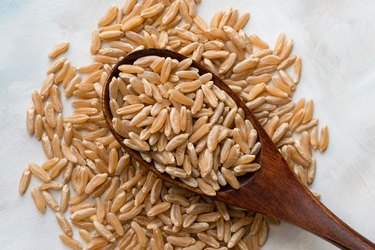
With its nutty flavor, kamut, which is also called Khorasan wheat, makes a worthwhile addition to your diet. It's available at health food stores, as well as at some grocery stores, as dry grains, or baked into breads, crackers and other baked goods.
Kamut boasts a broad nutritional profile, and it provides a considerable amount of protein and fiber, as well as several minerals.
Video of the Day
Video of the Day
Fiber and Protein
Kamut provides you with fiber, a type of carbohydrate, and protein, an essential macronutrient. Protein plays a central role in maintaining strong tissue and aids in oxygen transport and immune function, while fiber helps lower your cholesterol, fights type 2 diabetes and maintains digestive health.
Each 1-cup serving of cooked kamut contains 10 grams of protein, or 17 percent of the protein requirements for an average 150-pound individual, according to Harvard Health Publishing.
A cup of cooked kamut also provides you with 7.4 grams of dietary fiber, which is between 19 and 28 percent of the daily recommended intake, per the Mayo Clinic.
Selenium and Manganese
Consume kamut as an excellent source of the essential minerals selenium and manganese. Each serving contains between 78 and 100 percent of the daily recommended intake of manganese and your entire daily selenium requirement.
Both minerals function as antioxidants, which means they protect you from genetic mutations and cell membrane damage caused by free radicals. They also support your body's hormone balance — manganese helps you synthesize sex hormones, while selenium supports the production of thyroid hormones.
Magnesium and Zinc
Kamut also benefits your health by providing considerable amounts of magnesium and zinc. Each serving contains 83 milligrams of magnesium — between 20 and 26 percent of the recommended daily intake, as well as between 29 and 40 percent of the recommended daily zinc intake.
A diet rich in zinc benefits your immune system and promotes healthy thyroid function, while magnesium strengthens bone tissue and activates enzymes your cells need to function.
How to Eat More Kamut
Boil kamut until it's tender, and use it as a base for salads. Its slightly nutty flavor pairs well with toasted pecans, dried apricots, orange slices and a cranberry maple vinaigrette or with a mixture of roasted red pepper, kale, green onion and a lemon tahini dressing.
Alternatively, process raw kamut grains in your blender or food processor, and use them to make healthful porridge. Add more nutritional value by topping your porridge with blueberries and Greek yogurt or with fresh cranberries and sliced strawberries.
- USDA National Nutrient Database: "Wheat, Kamut Khorasan, Cooked"
- Linus Pauling Institute: "Fiber"
- Mayo Clinic: "Dietary fiber: Essential for a healthy diet"
- Harvard Health Publishing: "How much protein do you need every day?"
- Office of Dietary Supplements: Manganese
- Harvard T.H. Chan School of Public Health: "Selenium"
- Harvard T.H. Chan School of Public Health: "Magnesium"
- Mayo Clinic: "Zinc"